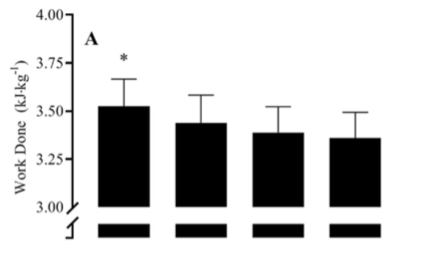Caffeine Intake for Time Trialing
/A lot of athletes are in the habit of using caffeine to enhance their time trial performance. What is really interesting to see in emerging literature from the science world is how much variability there can be in response to caffeine. There can be variability based on the timing of ingestion, but also variability between different individuals that has been linked to the presence of certain genes. The simple takeaway is to dial in an individual’s best use of caffeine it will take some testing of different scenarios. Here are a few different ideas to try in training:
Timing of Ingestion
A recent study (1) looked at the timing of caffeine ingestion and its effect on time-trial performance. The test they used involved doing a 30 min effort at a fixed power straight into a 15 min maximal effort. The 30 min effort was at a power corresponding to 83% of VO2 Max. The exact power at 83% of VO2 Max can vary across individuals, but it is likely pretty close (or a bit above) to an athlete’s maximal 60 min time trial pace. So the real world application of this study can be how caffeine timing improves ability in the last 15 min of a 45 min time trial. The researchers looked at four different scenarios, with every athlete being tested in each scenario:
Caffeine ingestion 35 min before starting the test (65 min pre 15 min maximum)
At the start of the test (30 min pre 15 min maximum)
30 min into the test (at start of pre 15 min maximum)
Placebo condition with no actual caffeine (done at all three time points above)
What they found was pretty clear, which makes it interesting and applicable! The only significant difference between the different scenarios occurred with caffeine ingestion 35 min before the start of the test compared to all the other scenarios. Stated another way, there was no performance improvement unless caffeine was taken 60 min prior to the final 15 min maximal effort. Here is a table looking at the work accomplished in the 15 min maximal effort (more work = more power!), amongst the different groups:
From left to right the groups are: 60 min pre-max, 30 min pre-max, onset of max, placebo (1).
Our takeaway is that timing of caffeine intake can be important. That said, this data shows what the average response is amongst the subjects they tested, which means it is not a rule that everyone will react this way. Also, note that their test looked at the performance in the final 15 min of a 45 min time trial, so optimal timing of ingestion probably depends as well on the length of the TT and when an athlete wants to get the most benefit from the caffeine. A key concept here, that they discuss further in the paper, is that it likely takes caffeine blood levels about 60 min to reach their peak, after ingestion. Our recommendation is test out a few different scenarios for different length time trials and see how you feel. You can experiment with these scenarios in training:
TT less than 30 min - take caffeine 60 min prior to start
TT of 30-45 min - take caffeine 45 min prior to start
TT of 45-60 min - take caffeine 30 min prior to start
Amount of Intake
In the study above everyone takes 200mg of caffeine. Given the average body mass, of 71 kg, of the study participants this workouts out to 2.8 mg/kg for the average. The individuals body mass ranged from 69-73 kg which changes the caffeine range to 2.9 to 2.7 mg/kg, so it is still a pretty small range. In this study they saw an effect with 200mg of caffeine, but there is research (2) that has shown as much as 5 mg/kg of caffeine being optimal. It is likely that there is a level of individual variability on what amount an athlete will perform best with that has to do with a few factors, including what their habitual intake is. Anecdotally, athletes that have very low habitual caffeine intake, may have negative symptoms like headache, nausea, jitteriness, from the same amount of caffeine that another athlete feels great with. So this is another area to test in training. Start out trying caffeine of 3 mg/kg of bodyweight and then progress it up to 5 mg/kg and see if you feel even better or if you feel worse.
When considering the amount of caffeine intake athletes also need to consider their source of caffeine. Not all coffee is created equal when it comes to caffeine content! A chart like the one below can give a general rule of thumb of caffeine content in different drinks. However, if an athlete really wants to control the amount the best way is with caffeine pills. Another good way is with instant coffee, this is especially good for those early morning races on the road where you may not not have quick access to something you know. Nescafe Original instant coffee has 170 mg of caffeine / 5 g of instant coffee.
The above graphic is from Asker Juekendrup’s website mysportscience.com. Asker is one of the leading sports nutritionist and has put out a lot of great information on nutrition as it pertains to endurance sport. His website is an excellent place to start when researching any nutritional question.
As always when interpreting scientific research, the takeaway as it applies to an individual is hardly a rule. That’s why testing it out for yourself is the best way to get the most out of these concepts. Try it out and let us know how it goes, and as always, thanks for reading!
Davenport, A. D., Jameson, T. S., Kilroe, S. P., Monteyne, A. J., Pavis, G. F., Wall, B. T., ... & Stephens, F. B. (2020). A Randomised, Placebo-Controlled, Crossover Study Investigating the Optimal Timing of a Caffeine-Containing Supplement for Exercise Performance. Sports Medicine-Open, 6, 1-12.
Hodgson, A. B., Randell, R. K., & Jeukendrup, A. E. (2013). The metabolic and performance effects of caffeine compared to coffee during endurance exercise. PloS one, 8(4).














